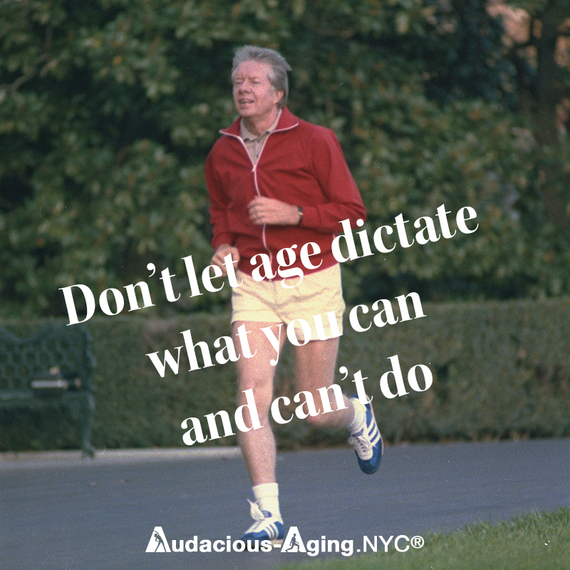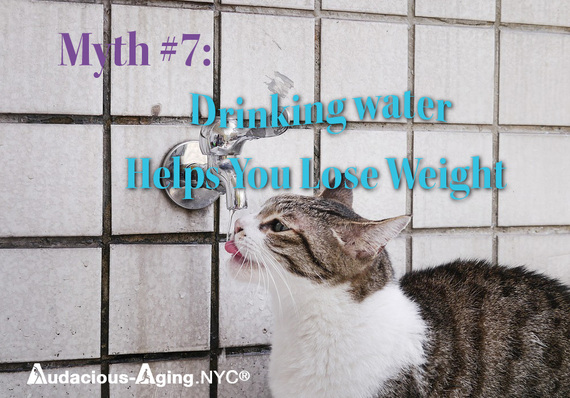Health and fitness is a life-long pursuit. As a beginner to fitness you need a practical approach. So, here is the practical truth: Exercise is for developing fitness. When your body is fit, it burns more calories (and fat!) than when it is less fit. Simple. Practical.
As a beginner, you may become a victim of oversimplified concepts and half-truths. The problem for most people is just getting started. (As if getting off the couch isn't hard enough!) These 7 myth-busters will help you make smart choices and find real ways to meet your fitness objectives.
Myth #1: As Long as I'm Moving, I'll Burn Fat
Fact: If you are walking like a snail and your goal is to burn fat, it's not going to happen. Since everyone's body is different and responds differently to training, a good cardio starting point is 40 minutes of cardio, 3 to 5 times a week in your target heart rate zone. Most commonly, the target heart rate zone is 60 percent to 85 percent of your max heart rate.
Myth #2: (Women) If I Lift Weights I'll Get Bulky
This is some of the most irresponsible information you'll find, and it's everywhere! Women typically produce lower levels of testosterone than men, meaning we're less physiologically prone to becoming brawny.
Fact: The Mayo Clinic reports that weight training is a key to preventing osteoporosis, creating lean muscle mass, raising your metabolic rate and creating strength. By limiting strength training you cheat your body out of the amazing benefits of strength training.
Fact: If you look at one pound of fat, and one pound of muscle side by side, you will notice how much smaller the muscle is even though it's the same weight. Meaning, the more muscle you have on your body, the less space you will take up.
Fact: Strength training actually will help you lose weight faster and keep it off in the long run.
Myth #3: (Men) I Must Sweat (for at least 45 minutes)
Fact: This isn't always the case. Sweat is a biological response that cools your skin and regulates internal body temperature. It's just as likely to be the result of an overheated studio, the weather, or your personal physiology, as it is a grueling gym session. It's possible to burn a significant number of calories without breaking a sweat.
Fact: Even if you've got a half an hour to spare a day -- even 10 minutes -- you have enough time to boost your cardiovascular health.
A study by researchers from McMaster University in Canada suggest that quickie sessions could actually be better for you. Of course, this may be enough to keep up your general health, and you'll need to get more active most days of the week if you're trying to drop some pounds. The recommendation from ACSM -- shoot for at least 150 minutes of moderate to vigorous exercise a week, in addition to walking, for the ultimate slim-down success.
Myth #4: You Can't Gain Muscle After 40
Fact: Age does bring wear and tear, but at 40 you're still a training baby unless you've been a competitive professional athlete since you were a teenager. You can gain muscle despite hormonal deficiencies -- it just may take a bit longer.
Myth #5: Exercising One Day a Week Is Better Than Nothing
Fact: If this is your training mantra, then you will fail. Sad, but true. The key to losing weight and keeping your weight at a normal range is a mixture of hard work and consistency. To lose one pound of weight a week, you have to have a 3,500-calorie deficiency a week. Consistent training, good food choices and proper water hydration will get you there much faster without the muscle depletion that dieting can cause.
Myth #6: Yoga is a Big Calorie Burner
Fact: While doing yoga improves flexibility and strength, it's not much of an aerobic activity, according to an ACE study: a 50-minute power yoga session burns 237 calories, vs. the 400 to 600 calories you'd generate in a Zumba class for that amount of time. Yoga doesn't burn a lot of calories because it doesn't require a lot of oxygen. It also doesn't stimulate muscle growth the way weight training does.
Myth #7: Drinking water Helps You Lose Weight
Fact: The evidence is lacking that drinking copious amounts of water to be the all-curing panacea of the gods. The evidence for such catch-all health benefits is lacking. Drink to replace the amount of water a healthy adult loses every day -- about four to six glasses.
Fact: You may eat less because you're busy trucking back and forth between the bathroom and dinner table, but that's about it. If you're curious, the way to determine if you're hydrated enough is to check the color of your urine. A light yellow indicates you're replacing enough lost fluids; a darker yellow or orange is an indication that you should have something to drink.
A Bonus Myth: Working Out at the Gym is More Effective than Exercising at Home
Fact: Sure, you may gain a few insights and tips, but with help setting up a routine, you're just as likely to achieve the results you want doing your routine at home.
Contact me at Audacious-Aging.NYC® for more information about in-home personal training and wellness coaching to prolong your active and healthy life.


